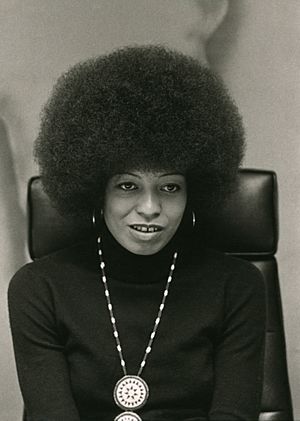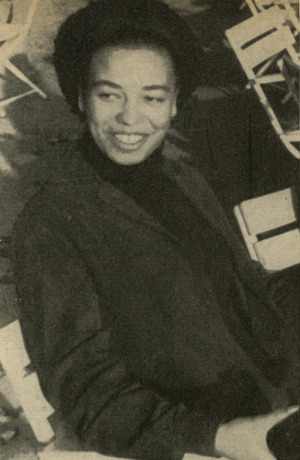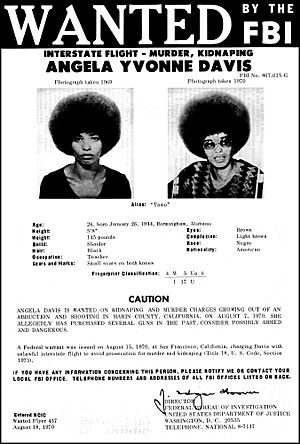Angela Davis facts for kids
Quick facts for kids
Angela Davis
|
|
|---|---|

1974 portrait of Davis by Bernard Gotfryd
|
|
| Born |
Angela Yvonne Davis
January 26, 1944 Birmingham, Alabama, U.S.
|
| Education | |
| Occupation |
|
| Political party |
|
| Awards | Lenin Peace Prize |
Angela Yvonne Davis (born January 26, 1944) is an American radical Marxist and feminist political activist, philosopher, academic, and author. She is a professor at the University of California, Santa Cruz. Davis was a longtime member of the Communist Party USA (CPUSA) and a founding member of the Committees of Correspondence for Democracy and Socialism (CCDS).
Contents
Early life
Davis was born in Birmingham, Alabama. She occasionally spent time on her uncle's farm and with friends in New York City. Her siblings include two brothers, Ben and Reginald, and a sister, Fania. Davis's mother, Sallye Bell Davis, was a national officer and leading organizer of the Southern Negro Youth Congress. Though their stated aim was to build alliances among African Americans in the South and ask for their fair treatment, it was influenced by the Communist Party. Davis grew up surrounded by communist organizers and thinkers who greatly influenced her ideas. Among them was the Southern Negro Youth Congress official Louis E. Burnham, whose daughter Margaret Burnham was Davis's friend from childhood, as well as her co-counsel during Davis's 1971 trial for murder and kidnapping.
By her junior year of high school, Davis had been accepted by an American Friends Service Committee (Quaker) program that placed black students from the South in integrated schools in the North. She chose Elisabeth Irwin High School in Greenwich Village. There she was recruited by a communist youth group, Advance.
Education
Davis was awarded a scholarship to Brandeis University in Waltham, Massachusetts, where she was one of three black students in her class. She saw the Frankfurt School philosopher Herbert Marcuse at a rally during the Cuban Missile Crisis and began to study his teachings. In 1965, she graduated magna cum laude, a member of Phi Beta Kappa.
Next, she attended University of Frankfurt for graduate work in philosophy. Many of her roommates were active in the radical Socialist German Student Union (SDS), and Davis participated in some SDS actions.
After returning to the United States, Davis earned a master's degree from the University of California, San Diego, in 1968. She became interested in groups like the Black Panther Party and the Student Nonviolent Coordinating Committee (SNCC). She joined the Che-Lumumba Club, an all-black branch of the Communist Party USA.
Post-graduate work
In 1969, she was hired as an assistant professor of philosophy at the University of California, Los Angeles (UCLA). UCLA's governing Board of Regents soon fired her because she was a member of the CPUSA. She was also affiliated with the Black Panther Party. After a court ruled the firing illegal, the university fired her for the use of inflammatory language, some of which was characterizing police officers as "pigs."
Arrest and trial
Davis was a supporter of the Soledad Brothers, three inmates who killed a prison guard at Soledad Prison. She befriended 17-year-old African-American high-school student Jonathan Jackson, whose brother was George Jackson, one of the three Soledad Brothers. On August 7, 1970, Jonathan Jackson was heavily armed when he raided a courtroom in Marin County. He shared some weapons with two black defendants. Jackson planned to convince Superior Court Judge Harold Haley to release the Soledad Brothers (including his older brother George) by kidnapping and threatening him. As the kidnappers were trying to leave with five hostages by car, one of them fired at police, causing a shootout that left four people dead, including the judge and Jonathan Jackson. Some of the guns used in the attack belonged to Angela Davis, including a shotgun she had purchased two days prior.
Davis disguised herself and fled. On October 13, 1970, FBI agents found her at a Howard Johnson Motor Lodge in New York City. She was arrested and brought to trial. Her lawyers hired experts to discredit the reliability of eyewitness accounts, and she was declared not guilty on June 4, 1972.
Other activities in the 1970s
After her not-guilty verdict, Davis began speaking to large crowds. She spoke in Cuba, where she had previously been welcomed by Fidel Castro in 1969 as a member of a Communist Party delegation. Part of her speech stated that "only under socialism could the fight against racism be successfully executed."
In August 1972, the Central Committee invited Davis to the USSR. She received an honorary doctorate from Moscow State University and financial support from the Soviet Union.
She also received money and an honorary doctorate from East Germany, where she spoke about racism and her support of the purpose of the Berlin Wall.
On May 1, 1979, she was awarded the Lenin Peace Prize from the Soviet Union. She visited Moscow later that month to accept the prize, where she praised "the glorious name" of Lenin and the "great October Revolution."
Later academic career
Davis was a lecturer at the Claremont Black Studies Center at the Claremont Colleges in 1975. She also taught courses at San Francisco Art Institute; San Francisco State University; the University of California, Santa Cruz; Rutgers University; Syracuse University; and Vassar College.
Political activism
Davis accepted the Communist Party USA's nomination for vice president, as Gus Hall's running mate, in 1980 and in 1984. They received less than 0.02% of the vote in 1980. She left the party in 1991 and began the Committees of Correspondence for Democracy and Socialism.
She has called the United States prison system the "prison–industrial complex." Davis wants to get rid of prisons in America, stating that they are like a modern form of slavery (rather than a consequence of a person's choice to commit a crime).
She has also written books and been interviewed on the topics about which she is passionate. She publicly speaks at universities and other events expressing her opinions against the war on terror, capitalism, events and positions held by males, police, the criminal justice system, and Israel.
Angela Davis quotes
- "When one commits oneself to the struggle, it must be for a lifetime."'
- "The work of the activist is not to fight for a single issue or a single cause but to pursue a political vision which will transform all issues and causes."
- "The longer prisons exist, the harder it becomes to imagine life without them."
Interesting facts about Angela Davis
- Davis spent her childhood surrounded by communist organizers and thinkers who greatly influenced her ideas.
- She traveled Europe during her college years.
- Davis gained the attention of the FBI by attending a communist-sponsored festival in Helsinki.
- She was a member of the Black Panther Party.
- Davis went into hiding before being arrested for her part in the kidnapping and murder of a judge.
- She was the third woman to appear on the FBI’s Ten Most Wanted Fugitives list.
- Davis was given honorary degrees by the Karl Marx University of Leipzig, Moscow State University, the University of Tashkent, and Dalhousie University.
- In 2018, a cotton shirt with Angela’s face was featured in Prada’s collection of the year.
- In 2020, she was included on Time's list of the 100 most influential people in the world.
See also
 In Spanish: Angela Davis para niños
In Spanish: Angela Davis para niños
- Africana philosophy
- Billy Strachan, headed the London branch of the Angela Davis Defence Committee



